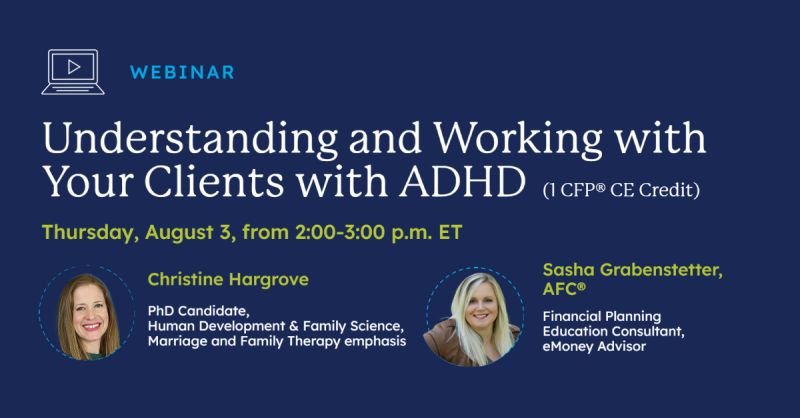Here’s a link to a good article on neurodiversity that has a wealth of embedded links in it: What is neurodiversity? – Harvard Health
Tag: professionals
Solution-Focused Financial Therapy
Request the full-text pdf of this article here: Solution-Focused Financial Therapy | Request PDF (researchgate.net)
Published version: Solution-Focused Financial Therapy | SpringerLink
Authors: Kristy Archuleta, John Grable, & Emily Burr
Solution-focused therapy (SFT) is a clinically proven psychotherapeutic approach that is known to be an effective tool in helping people deal with a variety of issues. SFT is a pragmatic approach based on a theoretical perspective that utilizes helping techniques that focus on client strengths, skills, and attributes rather than past and current problems. This chapter provides an overview of SFT and then presents an adaption of SFT suited specifically for dealing with financial issues: Solution-focused financial therapy (SFFT). Applications for clinical and practitioner settings to help clients reduce financial stress and move towards goal accomplishment are discussed.
Being Different but Striving to Seem Normal
“
Dealing with work and personal finances
For informants that actually were employed, the text revealed ongoing struggles with achieving a functional work-situation, combined with a fear of being excluded from workplace groups. Inability to control impulses seemed to be a factor that caused a lot of social problems, both at work and in personal relationships. Failing to pay bills and their household expenses was especially difficult to handle because it had serious financial consequences. When deciding between insurance, phone carriers, and other service providers, informants found it difficult to understand terms, conditions, and prices. This often led to less favorable deals and agreements which in turn led to even worse financial outcomes including higher costs for subscriptions and fees.”
eMoney

“Understanding and Working with Your Clients with ADHD”
Thursday, August 3rd, from 2:00 p.m. – 3:00 p.m. ET
Here’s a link to the related blog article I wrote with a link to watch the webinar replay: https://emoneyadvisor.com/blog/practical-strategies-for-supporting-clients-with-adhd/
Join us for a presentation that will provide a basic understanding of Attention-Deficit/Hyperactivity Disorder (prevalence, etiology, common symptoms) as well as current and emerging research regarding ADHD and financial well-being.
Hear how ADHD-associated impairments in executive functioning affect financial behavior, financial decision-making, and overall financial well-being, as well as how financial professionals can improve their effectiveness in working with clients with ADHD.
You will come away from this session with a clear framework for identifying and addressing unseen barriers to financial success experienced by clients with ADHD, research- and empirically-supported resources, and key tips for best practices for working with this population.
NARME 2023

I gave a presentation called “Elevating the Relationships of Couples with ADHD” at the National Alliance for Relationship and Marriage Education in July of 2023. I presented an overview of ADHD, a summary of existing research, preliminary findings of my research from the CARE Lab at UGA (with co-presenters Dr. Ted Futris and Dr. Evin Richardson), and recommendations for providing relationship and marriage education to participants with ADHD.
“Adult Attention Deficit/Hyperactivity Disorder (ADHD) affects an estimated 4.4 – 5% of the U.S. population. This common disorder can affect many areas of life: work, finances, health, parenting, and family life, including couple relationships. Millions of couples grapple with the daily challenges conferred on their relationship and lives together by one or both partner’s ADHD. Researchers and practitioners who work in couple relationship education (CRE) are keen to tailor our efforts to make our programs more ADHD-friendly, but may not know where to start. In this presentation, we will establish a baseline understanding of the symptoms, prevalence, and associated risks of adult ADHD, as well as current research regarding how ADHD effects couple functioning and stability. We will then share preliminary findings from an evaluation study examining the experiences of couples with ADHD who participated in the CRE program, ELEVATE: Taking your Relationship to the Next Level. Recommendations will be shared for educational programs working with couples with ADHD.”
4 Processes of Motivational Interviewing
This video helps break the trajectory of Motivational Interviewing into clear stages. This can help you recognize when you’re alliance-building and when you’re off-course.
Lifting the Burden in Motivational Interviewing
This is a brief introduction into Motivational Interviewing, which is a fantastic skill that I believe everyone working with the public needs to have!
Solution-Focused Therapy
This video is long, but Diane Gehart’s work is excellent and thorough.
Neuroinclusive Intake/Ongoing Assessments
I will update this post with new PDFs as I refine and expand my work. I’d love to hear from you regarding how you use these questions in your practices. Thank you!